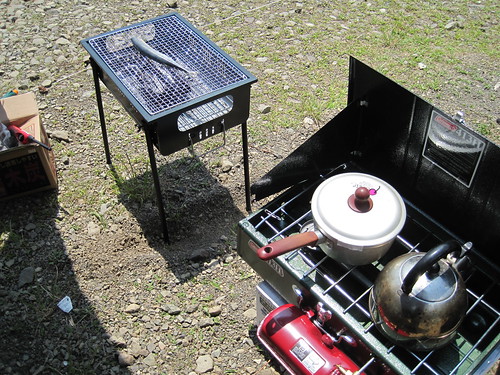今日は
県が企画するグローバール人材を
どうやったら育成できるかという会合で
県内のグローバル化を進めたい企業さんたちとの
意見交換会がありました
その中に5年前に卒業した
教え子の姿を見て立派に社会人をしているのを
頼もしく思いました。
最近考えるのは
どんなに勉学に対するモチベーションが低く
学力が伸びない学生でも
その卒業生のように、
いつかたった一人で
大人にならなければならない
日がくるということです
その時、工学の基礎知識や一般常識は役に立つはずで
そんな子らにも最低限の所までは身につけさせたいなと
思う今日この頃です
学力の低い子らは分数の計算も満足にできません
その子らは普段の授業はまったく理解できないはずです
そんな子らをどう教育していくかプロとして
試されているような気がします
2011年9月21日水曜日
UbuntuにJAVAをインストール
Ubuntuにソフトをインストールする作法がいまいち理解出来ていない
UbuntuにJAVAをインストール
資料
http://www.wikihow.com/Install-Oracle-Java-on-Ubuntu-Linux
以下は資料のページのコピー
1
Let's check if you have Java installed on your system by running the Java version command from terminal.
2
Open up a terminal and type the command:
Type/Copy/Paste: java -version
If it says anything such as OpenJDK, you have the wrong Java installed for this exercise, we want it to display:
java version "1.7.0"
Java(TM) SE Runtime Environment (build 1.7.0-b147)
Java HotSpot(TM) 64-Bit Server VM (build 21.0-b17, mixed mode)
3
If you have the OpenJDK installed on your system you can remove it by typing the following at the command line:
Type/Copy/Paste: sudo apt-get autoremove openjdk-6-jre
Type/Copy/Paste: sudo apt-get autoremove openjdk-6-jdk
4
Create a directory to put your Oracle Java JDK and JRE binaries in, open up a terminal and create the directory /usr/local/java
Type/Copy/Paste: sudo mkdir -p /usr/local/java
5
Download the Oracle Java JDK/JRE for Linux, make sure you select the compressed binaries for your system which end in tar.gz
6
Change into the directory where the Oracle Java binaries were downloaded and move them into the /usr/local/java directory. For example, in most cases the Oracle Java binaries are downloaded to: /home/"your_user_directory"/Downloads
Type/Copy/Paste: sudo -s
Type/Copy/Paste: cd /home/"your_user_directory"/Downloads
Type/Copy/Paste: cp -r jdk-7-linux-x64.tar.gz /usr/local/java
Type/Copy/Paste: cp -r jre-7-linux-x64.tar.gz /usr/local/java
Type/Copy/Paste: cd /usr/local/java
7
Run the following commands on the downloaded Oracle Java tar.gz files, as root, in order to make them executable for all users on your system.
Type/Copy/Paste: sudo chmod a+x jdk-7-linux-x64.tar.gz
Type/Copy/Paste: sudo chmod a+x jre-7-linux-x64.tar.gz
8
Unpack the compressed java binaries, in the directory /usr/local/java
Type/Copy/Paste: tar xvzf jdk-7-linux-x64.tar.gz
Type/Copy/Paste: tar xvzf jre-7-linux-x64.tar.gz
9
At this point you should have two uncompressed binary directories in /usr/local/java for the Java JDK/JRE listed as:
jdk1.7.0
jre1.7.0
10
Edit the system PATH file /etc/profile and add the following system variables to your system path. Use nano, gedit or any other text editor, as root, and open up /etc/profile
Type/Copy/Paste: sudo nano /etc/profile
or
Type/Copy/Paste: sudo gedit /etc/profile
11
Scroll down using your arrow keys to the end of the file and add the following lines below to the end of your /etc/profile file in Ubuntu Linux:
12
Type/Copy/Paste:
JAVA_HOME=/usr/local/java/jdk1.7.0
PATH=$PATH:$HOME/bin:$JAVA_HOME/bin
JAVA_HOME=/usr/local/java/jre1.7.0
PATH=$PATH:$HOME/bin:$JAVA_HOME/bin
export JAVA_HOME
export JAVA_BIN
export PATH
13
Save the file and exit.
14
Inform your Ubuntu Linux system where your Oracle Java JDK/JRE is located, now you will want to tell the system Oracle Java 1.7.0 version is available for use.
Type/Copy/Paste: sudo update-alternatives --install "/usr/bin/java" "java" "/usr/local/java/jre1.7.0/bin/java" 1
Type/Copy/Paste: sudo update-alternatives --install "/usr/bin/javac" "javac" "/usr/local/java/jdk1.7.0/bin/javac" 1
15
Inform your Ubuntu Linux system, that Oracle Java JDK/JRE must be the default Java.
Type/Copy/Paste: sudo update-alternatives --set java /usr/local/java/jre1.7.0/bin/java
Type/Copy/Paste: sudo update-alternatives --set javac /usr/local/java/jdk1.7.0/bin/javac
16
Also reload your system wide PATH /etc/profile by typing the following command:
17
Type/Copy/Paste: . /etc/profile
Note your system wide PATH /etc/profile file will reload after reboot of your Ubuntu Linux system
18
You can test to see if Oracle Java was installed correctly on your system by running the following commands and noting the version of Java
19
Type/Copy/Paste: java -version
this command displays the version of java running on your system
20
You should receive a message which displays:
java version "1.7.0"
Java(TM) SE Runtime Environment (build 1.7.0-b147)Java HotSpot(TM) 64-Bit Server VM (build 21.0-b17, mixed mode)
21
Type/Copy/Paste: javac -version
this command lets you know that you are now able to compile java programs from the terminal
22
You should receive a message which displays:
javac 1.7.0
23
Now, reboot your Ubuntu Linux system and your system will be fully configured for running and developing Java programs.
UbuntuにJAVAをインストール
資料
http://www.wikihow.com/Install-Oracle-Java-on-Ubuntu-Linux
以下は資料のページのコピー
1
Let's check if you have Java installed on your system by running the Java version command from terminal.
2
Open up a terminal and type the command:
Type/Copy/Paste: java -version
If it says anything such as OpenJDK, you have the wrong Java installed for this exercise, we want it to display:
java version "1.7.0"
Java(TM) SE Runtime Environment (build 1.7.0-b147)
Java HotSpot(TM) 64-Bit Server VM (build 21.0-b17, mixed mode)
3
If you have the OpenJDK installed on your system you can remove it by typing the following at the command line:
Type/Copy/Paste: sudo apt-get autoremove openjdk-6-jre
Type/Copy/Paste: sudo apt-get autoremove openjdk-6-jdk
4
Create a directory to put your Oracle Java JDK and JRE binaries in, open up a terminal and create the directory /usr/local/java
Type/Copy/Paste: sudo mkdir -p /usr/local/java
5
Download the Oracle Java JDK/JRE for Linux, make sure you select the compressed binaries for your system which end in tar.gz
6
Change into the directory where the Oracle Java binaries were downloaded and move them into the /usr/local/java directory. For example, in most cases the Oracle Java binaries are downloaded to: /home/"your_user_directory"/Downloads
Type/Copy/Paste: sudo -s
Type/Copy/Paste: cd /home/"your_user_directory"/Downloads
Type/Copy/Paste: cp -r jdk-7-linux-x64.tar.gz /usr/local/java
Type/Copy/Paste: cp -r jre-7-linux-x64.tar.gz /usr/local/java
Type/Copy/Paste: cd /usr/local/java
7
Run the following commands on the downloaded Oracle Java tar.gz files, as root, in order to make them executable for all users on your system.
Type/Copy/Paste: sudo chmod a+x jdk-7-linux-x64.tar.gz
Type/Copy/Paste: sudo chmod a+x jre-7-linux-x64.tar.gz
8
Unpack the compressed java binaries, in the directory /usr/local/java
Type/Copy/Paste: tar xvzf jdk-7-linux-x64.tar.gz
Type/Copy/Paste: tar xvzf jre-7-linux-x64.tar.gz
9
At this point you should have two uncompressed binary directories in /usr/local/java for the Java JDK/JRE listed as:
jdk1.7.0
jre1.7.0
10
Edit the system PATH file /etc/profile and add the following system variables to your system path. Use nano, gedit or any other text editor, as root, and open up /etc/profile
Type/Copy/Paste: sudo nano /etc/profile
or
Type/Copy/Paste: sudo gedit /etc/profile
11
Scroll down using your arrow keys to the end of the file and add the following lines below to the end of your /etc/profile file in Ubuntu Linux:
12
Type/Copy/Paste:
JAVA_HOME=/usr/local/java/jdk1.7.0
PATH=$PATH:$HOME/bin:$JAVA_HOME/bin
JAVA_HOME=/usr/local/java/jre1.7.0
PATH=$PATH:$HOME/bin:$JAVA_HOME/bin
export JAVA_HOME
export JAVA_BIN
export PATH
13
Save the file and exit.
14
Inform your Ubuntu Linux system where your Oracle Java JDK/JRE is located, now you will want to tell the system Oracle Java 1.7.0 version is available for use.
Type/Copy/Paste: sudo update-alternatives --install "/usr/bin/java" "java" "/usr/local/java/jre1.7.0/bin/java" 1
Type/Copy/Paste: sudo update-alternatives --install "/usr/bin/javac" "javac" "/usr/local/java/jdk1.7.0/bin/javac" 1
15
Inform your Ubuntu Linux system, that Oracle Java JDK/JRE must be the default Java.
Type/Copy/Paste: sudo update-alternatives --set java /usr/local/java/jre1.7.0/bin/java
Type/Copy/Paste: sudo update-alternatives --set javac /usr/local/java/jdk1.7.0/bin/javac
16
Also reload your system wide PATH /etc/profile by typing the following command:
17
Type/Copy/Paste: . /etc/profile
Note your system wide PATH /etc/profile file will reload after reboot of your Ubuntu Linux system
18
You can test to see if Oracle Java was installed correctly on your system by running the following commands and noting the version of Java
19
Type/Copy/Paste: java -version
this command displays the version of java running on your system
20
You should receive a message which displays:
java version "1.7.0"
Java(TM) SE Runtime Environment (build 1.7.0-b147)Java HotSpot(TM) 64-Bit Server VM (build 21.0-b17, mixed mode)
21
Type/Copy/Paste: javac -version
this command lets you know that you are now able to compile java programs from the terminal
22
You should receive a message which displays:
javac 1.7.0
23
Now, reboot your Ubuntu Linux system and your system will be fully configured for running and developing Java programs.
2011年9月18日日曜日
Linux Ubuntu TeX
仕事のPCのOSをLinuxへ変更する試みをしている
とりあえず2T(!)のHDDを新規に購入した
ディストリビューションはUbuntuを選択
BIOSでNewHDDを認識させなかったのでインストール後に起動せず悩む
それでもUbuntuのインストーラーはHDDを認識していたのでその間違いに気がつかなかった
1台目のHDDにはXPがあり膨大なこれまでのデータが入っていたのでXPも立ち上がらなくなりあせる
1台目のHDDのMBRを再構築してXPだけでも立ち上げようとして失敗
途中BIOSの設定を確認して2台目のHDDの接続を設定したらあっけなくGRUBのOSのセレクターが立ち上がってOSデュアルブートに成功
いろんなソフトを入れてみて遊ぶ
LaTeXの設定が大変なのでここにメモ
インストール関係資料
http://www10.atwiki.jp/shirayuu/pages/61.html
使い方関係
http://bach.istc.kobe-u.ac.jp/lect/tamlab/ubuntu/latex.html
アドミ権限でエディタを立ち上げて設定ファイルの書き換え
$ sudo gedit
とりあえず2T(!)のHDDを新規に購入した
ディストリビューションはUbuntuを選択
BIOSでNewHDDを認識させなかったのでインストール後に起動せず悩む
それでもUbuntuのインストーラーはHDDを認識していたのでその間違いに気がつかなかった
1台目のHDDにはXPがあり膨大なこれまでのデータが入っていたのでXPも立ち上がらなくなりあせる
1台目のHDDのMBRを再構築してXPだけでも立ち上げようとして失敗
途中BIOSの設定を確認して2台目のHDDの接続を設定したらあっけなくGRUBのOSのセレクターが立ち上がってOSデュアルブートに成功
いろんなソフトを入れてみて遊ぶ
LaTeXの設定が大変なのでここにメモ
インストール関係資料
http://www10.atwiki.jp/shirayuu/pages/61.html
使い方関係
http://bach.istc.kobe-u.ac.jp/lect/tamlab/ubuntu/latex.html
アドミ権限でエディタを立ち上げて設定ファイルの書き換え
$ sudo gedit
2011年9月4日日曜日
ご無沙汰です


最後の投稿の頃は学生が夏休みに入った頃でしたが
早いものでそれも終わり,今は前期の期末試験直前となりました
まだまだ蒸し暑い日が続いています
夏のうちに年も41歳になり人生折り返しです
誕生日にはイベリコ豚のしゃぶしゃぶなどを食べて
小満悦でした
夏はテントとホワイトガソリンバーナーを買い
富士山の麓の本栖湖までキャンプに行きました
昔やってたことがやりたくなるのか,仕事でやってたときは
キャンプそんなに好きでもなかったのですが今は楽しいです
不思議ですね
来年はガソリンランタンを買いたいです
途中松本,甲府により帰りは下呂によっての旅行
長いドライブでしたが楽しかったです
教育,事務仕事,学科運営,部外公演,学業,趣味,生活もうToDO山積みで訳がわからんくなりそうですが
ストレスフリーにするべく,自己マネジメントをきっちりやっていかなければなりません
すこし項目ごとに見てみると・・
●教育
毎年の学生のレベル大きな変動に対応する授業の組み立て,達成状況の評価手法の検討,課題等の模範解答の作成,模範図面の製図,授業準備,卒業研究の監督指導,クラブ活動の監督指導,会議会議会議,部外協力企業協力者との調整
●事務仕事
いろんな雑用がわんさか.出張申請なんかも,旅費とか計算してたら軽く30分とかかかるからバカにならない仕事です
●学科運営
来年の科目担当案,担任担当,学外講師の招致,新しい授業の編成,将来の授業カリキュラムの検討,根回し等々
●部外公演
中学校出前授業,ロボット学外展示,科学イベントへの協力
●学業
研究,投稿論文へ向けての準備,これがかなり気がかりな項目,知恵をしぼり頑張る
●趣味
マイクロマウス(自分で作りたいなあ・・),同好会活動,大会運営,USBでシリアル通信又は通信(これから勉強,学生教育に近いが・・),支部お手伝い
●生活
掃除・洗濯・料理(好きなのでもっとやりたいけどできない)・明るい家族計画・貯蓄・資産運用,くうねるあそぶ,おつきあい
嗚呼!いっぱいいっぱい,毎日メールもいっぱいいっぱい
でも,笑ってがんばろう
登録:
コメント (Atom)